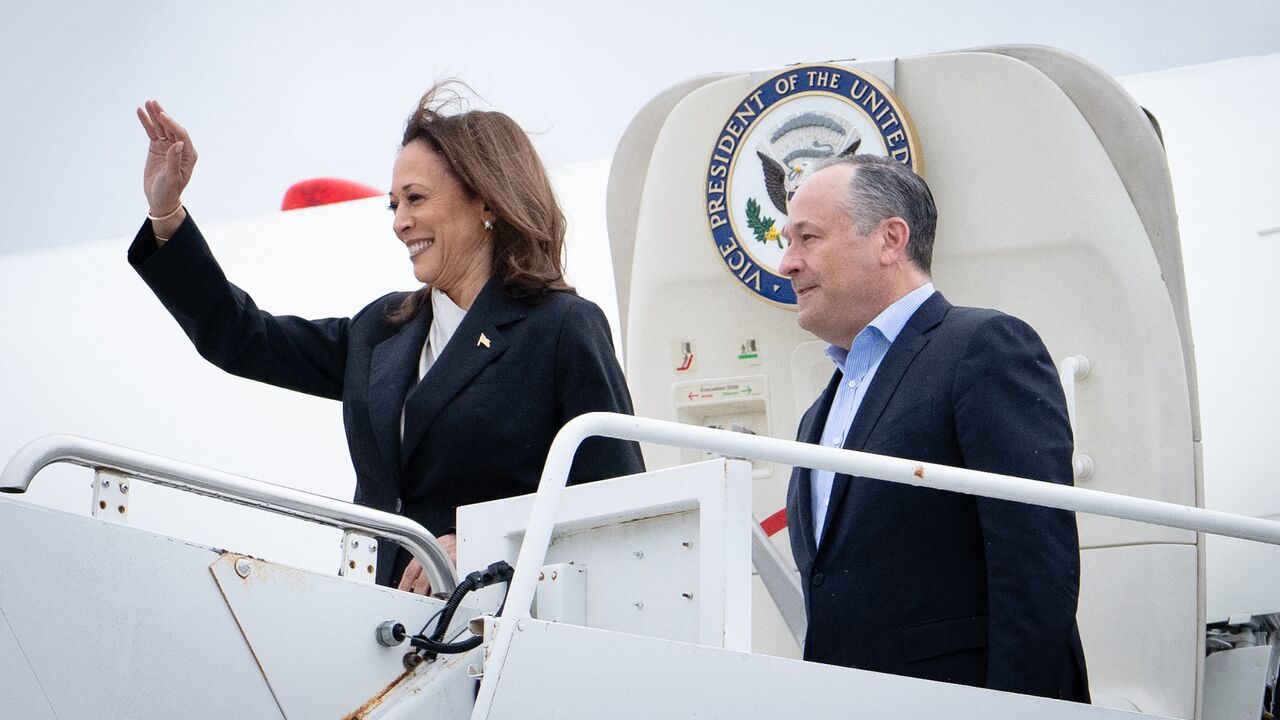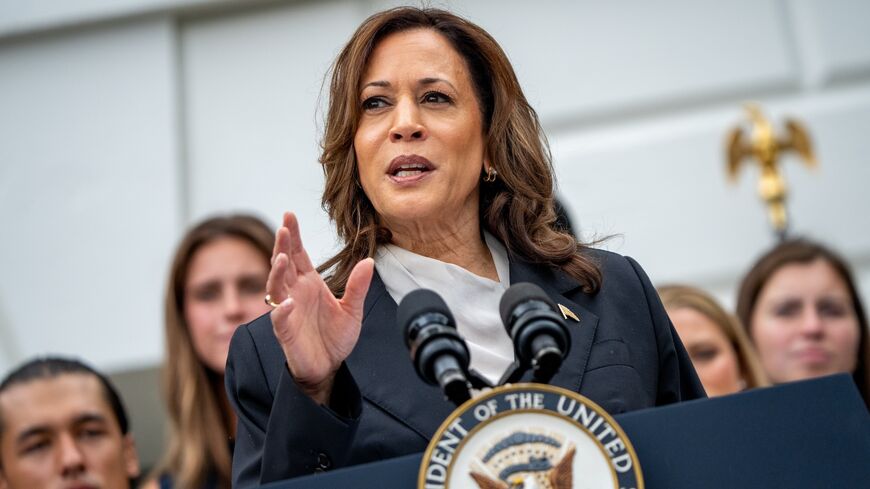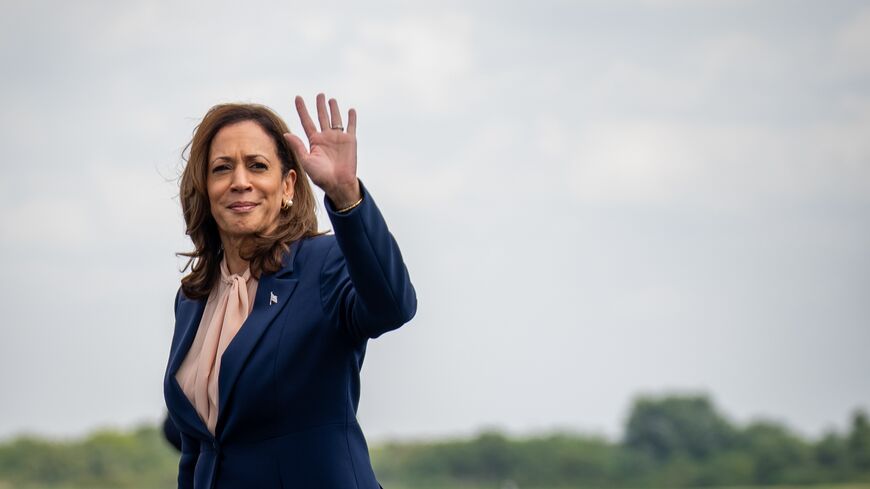What Kamala Harris has said on Israel, Gaza war
Vice President Kamala Harris is unlikely to significantly deviate from President Joe Biden’s line on Israel during the election campaign, but she could harshen the tone if elected president.

Considered to the left of President Joe Biden on the Gaza war and Israeli policy, Vice President Kamala Harris is expected to adopt a slightly more critical approach of Israel's military conduct when she likely becomes the Democratic nominee for president — and an even harsher approach if she wins the election, experts tell Al-Monitor.
"We don’t know enough," Ziegler Distinguished Fellow at The Washington Institute David Makovsky, who served on the US negotiating team during the 2013-2014 Israeli-Palestinian talks, told Al-Monitor. "On the one hand, she is identified with warning against the signaling out of Israel, that there is an element of antisemitism in that. On the other hand, she has been quite outspoken about Palestinian suffering in Gaza."
In making his assessment, Makovsky drew on the speech Harris delivered in Dubai last December, when she said that Israel "must do more to protect civilian life [in Gaza]." Reaffirming the Biden administration's stance that Israel had the right to defend itself against Hamas after the Gaza-based group's Oct. 7 attack on southern Israel, Harris also expressed concerns about widespread Palestinian suffering and warned that "international humanitarian law must be respected."
Contrary to high-ranking members of the Biden foreign policy and defense team, including US Secretary of State Antony Blinken, national security adviser Jake Sullivan, Defense Secretary Lloyd Austin and Biden himself, among others, Harris has not traveled to Israel since Oct. 7. While Biden has had dealings with Netanyahu for four decades and touts their close relationship despite its obvious souring in recent months, Harris has met the Israeli premier only a handful of times.
Harris on the Gaza war
Addressing the Munich Security Conference in February, Harris said that Hamas had used rape of Israeli women as a weapon of war, but she added that "we have also been clear that far too many innocent Palestinians have been killed, that Israel must do better to protect innocent civilians." On that occasion, Harris also called on Israelis and Palestinians to go back to the negotiating table, noting that "there cannot be, in my opinion, peace and security for that region — for the people of Israel or the Palestinians and the people of Gaza — without a two-state solution."
Harris’ call to protect the lives of Gaza civilians did not markedly differ from statements made by Biden. Still, contrary to Biden, in a July 8 interview with The Nation, Harris went into greater detail on the suffering of Gazans. "I ask questions like, What are people actually eating right now [in Gaza]? I’m hearing stories about their eating animal feed, grass … so that’s how I think about it," The Nation quoted Harris as saying.
Meanwhile, Harris' aides indicated Monday that the vice president will not preside over Prime Minister Benjamin Netanyahu’s speech to Congress on Wednesday due to previously planned travel. Still, Harris will keep her meeting with Netanyahu in Washington at the White House. According to Politico, Harris is expected to ask Netanyahu at their meeting to end the war in Gaza.
Still, with more limited foreign policy experience than Biden, many of Harris' foreign policy positions appear to align with those of her boss. Harris referred to the issue of West Bank settlement and extremist settlers in her meeting in Washington last November with Israeli President Isaac Herzog. A White House readout after the meeting said Harris "raised the need to increase stability and security in the West Bank and hold extremist settlers accountable for violent acts." The Biden administration has imposed sanctions on several individuals and entities accused of committing violence against Palestinians in the West Bank.
Obama redux?
Israeli and American experts warn it is too soon to have a clear picture on the policy Harris will espouse on Israel in general and on the Gaza war in particular, as she has not yet officially received the nomination as the Democratic Party candidate. Still, many point to the fact that she has less of a sentimental and ideological attachment to Israel than Biden who has labeled himself a Zionist.
"Biden is a uniquely historical figure because he has been around for decades. He very much sees himself as someone deeply, ideologically committed to Israel," Makovsky said.
"Despite the fact that she is married to a Jewish man, grew up in a Jewish political environment and has many Jewish friends, that does not mean that she has an emotional attachment to Israel, the kind that Biden or former President Bill Clinton have," former consul general in New York, adviser and chief of staff to four foreign ministers, and Haaretz columnist Alon Pinkas tells Al-Monitor.
Pinkas says that Harris is likely to toe a similar line to former President Barack Obama on regional affairs. "The Middle East is after all a foreign policy issue, and she is thinking of the United States first and foremost, not about Israel," he said. Despite Obama’s signing in 2016 of the biggest military aid package to Israel in history — amounting to $38 billion for a 10-year period — he was considered by many Israelis as hostile to the Jewish state and his relationship with Netanyahu was very frosty.
Three and a half months out from the presidential election and trying to unite her own party, Harris finds herself in a tight spot as she seeks to signal continuity of Biden's foreign policy while trying to energize younger voters opposed to Biden's policy on the Gaza war. "Harris is going to have to be more sympathetic to the younger generation that protested on campuses [against the Gaza war] or in the state of Michigan against Biden’s policy," Pinkas said. "She will have to somewhat distance herself from Biden, but she is going to keep it very minimal," as Israel is not a key issue in the American presidential elections where immigration and inflation will dominate.









